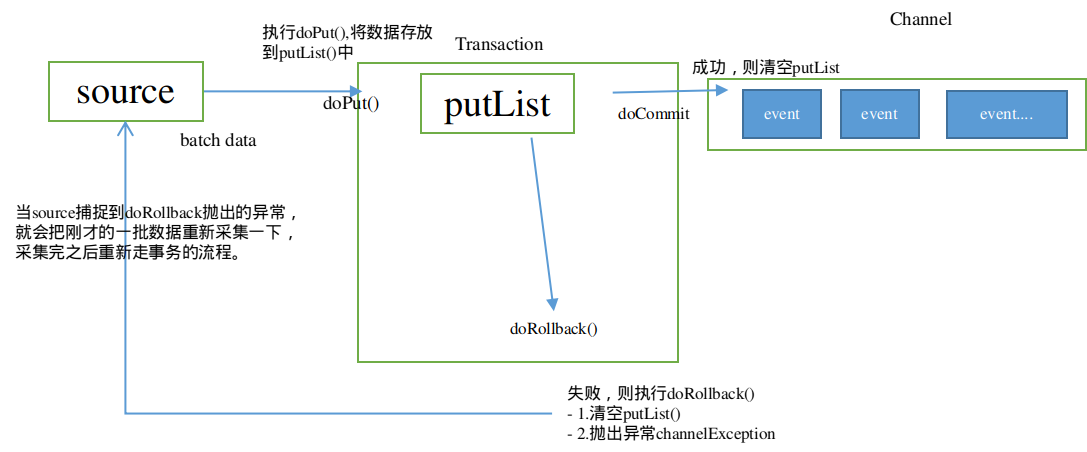Flume 事务和内部原理
1.Flume 事务
Flume使用两个独立的事务分别负责从soucrce到channel,以及从channel到sink的事件传递。
在Source到Channel之间的叫put事务,在Channel到Sink之间的叫Take事务。
事务两个特性就是:成功了提交,失败了回滚。
1.1 put事务
从source到channel过程中,数据在flume中会被封装成Event对象,多个event被放到一个事务中,
然后把这个包含events的事务放到channel中。

- 1.事务开始的时候会调用一个doPut方法,doPut方法的会将这批数据batch data,也就是一批event放到putList中。
doPut传递的数据的大小可以通过参数bathchSize配置。
putList的大小则通过channel的参数transactionCapacity进行配置。 - 2 当数据成功存放到putList之后,调用doCommit()方法,putList中所有的event进入channel()中,
- 1)成功则清空putList.
- 2) 不成功的情况
- 从putList传输到channel过程出问题,在doCommit提交之后,事务在向channel放的过程中,遇到问题。
sink那边取数据速度要比Source这边放数据速度慢,导致channel中的数据积压,这个时候就会造成putList中的数据放不进去。
这时会进行事务的回滚操作,调用doRollback方法,doRollback方法会做两个事情:
- 1、清空putList中的数据;
- 2、抛出channelException异常。
当source捕捉到doRollback抛出的异常,就会把刚才的一批数据重新采集一下,采集完之后重新走事务的流程。
- 在数据采集的过程中也有可能出现问题,同样是调用doRollback方法来对事务进行回滚。
1.2 take事务

- 1.事务开始时,调用doTake方法,将channel中的event提取到(剪切)takeList中,
- 2.如果后面的sink是HDFS Sink,同时在写入HDFS的IO缓冲流中放一份event。
- 3.当takeList中存放的Event达到约定数量(batchSize) ,就会调用doCommit方法:
- 成功执行情况下:
- 如果是HDFS Sink,那么手动调用IO流的flush方法,将IO流缓冲区的数据写入到HDFS磁盘中,同时清空takeList中的数据
- 失败情况下:
- 1.网络延迟等原因导致传输数据失败,
调用doRollback方法来进行回滚,takeList中还有备份数据,所以将takeList中的数据原封不动地还给channel,这时候就完成了事务的回滚。
- 2.如果takeList数据有一部分传输成功了,剩下的因为网络延迟传输失败了。
同样会调用doRollback方法来进行回滚,它会把整个takeList中的数据返回给channel,然后继续进行数据的读写。
如此一来,再次进行事务时候,就会存在数据重复的可能。
2.Flume内部原理
- 1). Source采集数据
EventBuilder.withBody(body)将数据封装成Event对象,
getChannelProcessor().processEvent(event)将数据交给Channel Processor
通过源码可以看到,以avro source为例
public Void append(AvroFlumeOGEvent evt) throws AvroRemoteException
{
.....
Event event = EventBuilder.withBody(evt.getBody().array(), headers); // 将数据封装成Event对象,
try {
getChannelProcessor().processEvent(event); // 将数据交给Channel Processor
this.counterGroup.incrementAndGet("rpc.events");
} catch (ChannelException ex) {
return null;
}
this.counterGroup.incrementAndGet("rpc.successful");
return null;
}
- 2)Channel Processor将Event事件传递给拦截器链interceptorChain.intercept(event),然后将数据返回给Channel Processor。
- 3)Channel Processor将拦截过滤之后的Event事件传递给Channel选择器(Channel Selector)),Channel Selector返回给Channel Processor写入event事件的Channel列表
其中Channel Selectors有两种类型:
- 1.Replicating Channel Selector : 将source过来的events发往所有的channel(相当于复制多份,默认使用的channel selector)
- 2.Multiplexing Channel Selector:可以指定source发过来的events发往的channel - 4)Channel Processor根据Channel选择器的选择结果,将Event事件写入相应的Channel
看下channel Processor源码
首先构造器中直接定义了selector和拦截器interceptorChain
public ChannelProcessor(ChannelSelector selector)
{
this.selector = selector;
this.interceptorChain = new InterceptorChain();
}
然后在processEvent和processEventBatch(List
public void processEvent(Event event)
{
event = this.interceptorChain.intercept(event); // 提交到拦截器链
if (event == null) {
return;
}
List requiredChannels = this.selector.getRequiredChannels(event); // 提交到channel 选择器
for (Iterator localIterator = requiredChannels.iterator(); localIterator.hasNext(); ) { reqChannel = (Channel)localIterator.next();
Transaction tx = reqChannel.getTransaction();
Preconditions.checkNotNull(tx, "Transaction object must not be null");
try {
tx.begin();
reqChannel.put(event);
tx.commit();
} catch (Throwable t) {
tx.rollback();
if ((t instanceof Error)) {
LOG.error("Error while writing to required channel: " + reqChannel, t);
throw ((Error)t);
}if ((t instanceof ChannelException)) {
throw ((ChannelException)t);
}
throw new ChannelException("Unable to put event on required channel: " + reqChannel, t);
}
finally
{
if (tx != null)
tx.close();
}
}
Channel reqChannel;
List optionalChannels = this.selector.getOptionalChannels(event);
for (Channel optChannel : optionalChannels) {
Transaction tx = null;
try {
tx = optChannel.getTransaction();
tx.begin();
optChannel.put(event); // 将event事件写入channel
tx.commit();
} catch (Throwable t) {
tx.rollback();
LOG.error("Unable to put event on optional channel: " + optChannel, t);
if ((t instanceof Error))
throw ((Error)t);
}
finally {
if (tx != null)
tx.close();
}
}
}
}
。
- 5)SinkProcessor启动sink,sink在channel中去轮询,取出channel中的event事件。
SinkProcessor有三种,
- DefaultSinkProcessor(默认的,内部无任何逻辑,只是单纯的调用sink)、
- LoadBalancingSinkProcessor(负载均衡)、
- FaioverSinkProcessor(容灾恢复)



 浙公网安备 33010602011771号
浙公网安备 33010602011771号